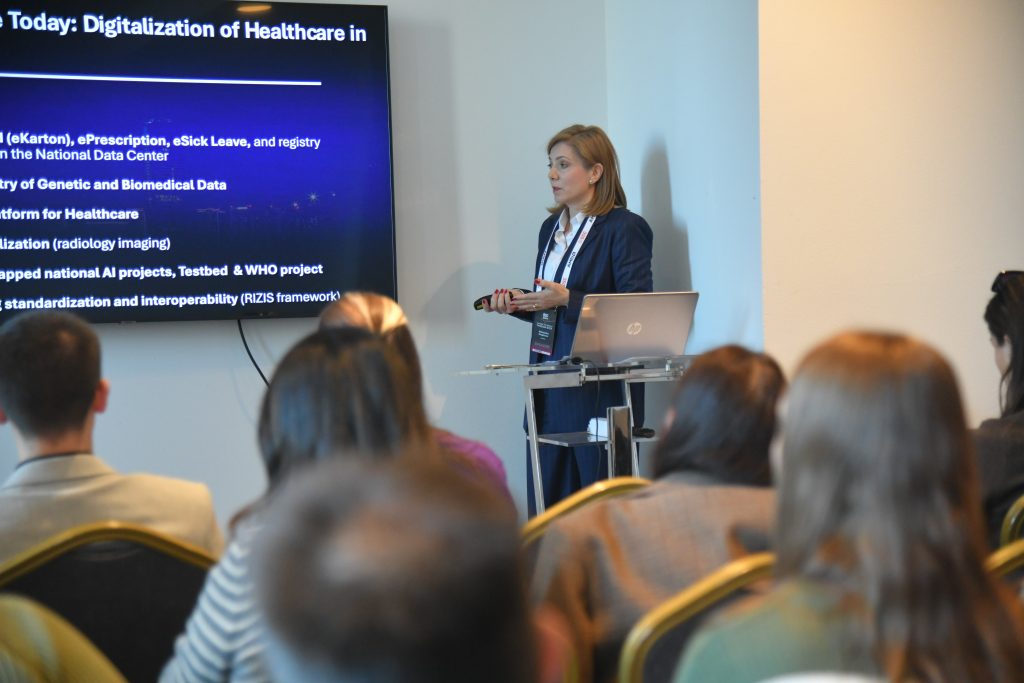Integrating the archives of all health institutions into a single data system, eHealthRecord and the Genetic and Biomedical Data Registry are key innovations brought by the new Law on Health Documentation and Records. These advancements will raise data protection to the highest standards, empower doctors to leverage information more effectively, and ultimately, deliver enhanced healthcare for patients.
The C4IR Serbia and NALED played an important role in drafting this Law, providing support to the Coordinating Body for Digitization in the Health System and the Ministry of Health of the Government of the Republic of Serbia. Special set of activities involved forming a working group dedicated to shaping the Genetic and Biomedical Data Registry. In addition to representatives of the C4IR Serbia and NALED, the group included representatives of the Office for IT and eGovernment, the University of Belgrade Faculty of Biology, the Institute of Molecular Genetics and Genetic Engineering (IMGGE), and IORS.
With the introduction of the eHealthRecord, for the first time, the history of diseases and treatment of citizens from health centers, hospitals, state, and private practices will be unified in one place, and access to the eHealthRecord will be available to the selected doctor, specialist to whom the authorization will be transferred, emergency medical service, medical commission, or doctor to whom the patient gives access. This will speed up the journey through the health system, prevent repeat analyzes and returning to the general practitioner for new instructions, which will overall contribute to more effective treatment results.
All information systems in healthcare will be interconnected in the unique Republic Integrated Health Information System, RIZIS, which will contain information systems of RFZO, Batut, ALIMS and others that are planned to be established, in addition to eCarton.
– One of the key novelties is eHealthRecord, which allows your chosen doctor, without retyping huge documentation, to have insight into all aspects of treatment and can track which drugs have been prescribed for you, laboratory findings, discharge lists and specialist reports. At the same time, all patients will have access to their eCard and will no longer have to carry all the documentation from doctor to doctor. In addition, another very important innovation is the establishment of the Register of Genetic and Biomedical Data, which opens the door to the development of modern diagnostics, early detection of genetically determined diseases, the development of personalized medicine – said Jelena, program director of NALED and executive director of the Center for the Fourth Industrial Revolution in Serbia. Bojović.
In Serbia, genetic analyzes are already carried out at 11 institutes. The establishment of the Registry ensures secure storage of sensitive genetic information in the Government Data Center and when combined with health data, it will have a much greater potential for improving diagnostics, prevention, and treatment of hereditary and rare diseases, paving the way for personalized therapies, and advancing public health. Through this system, it will be possible to connect scientific-research institutes dealing with genetic analyzes and the health system, secure exchange of biomedical data, necessary for the interpretation of genetic analyses, and deliver the results of those tests to the patient’s eHealthRecord with the necessary data protection or encryption.
The establishment of the Registry will guarantee the highest level of security and data protection, and the new Law on Health Documentation will regulate the issue of access and use for scientific and research purposes, with the aim of ensuring the use of anonymized, aggregated, and statistical data, which will enable development of biomedical science and software that provide faster diagnostics, easier identification of rare diseases and conditions, contraindications, or potential side effects.
Next year, the project of voluntary DNA screening, i.e., a type of pilot program for the development of personalized medicine, will begin in Serbia. By using advanced technologies in genetic analysis, the aim is to analyze the genetic characteristics of participants, focusing on the most common diseases in Serbia such as cancer and cardiovascular diseases, as well as rare diseases and genetic analysis concerning drug sensitivity. This initiative holds the promise of significantly enhancing therapy effectiveness and preventing these diseases.
The Law on Health Documentation and Health Records was adopted by the National Assembly, last week, at the proposal of the Ministry of Health, within the project “Serbia at Your fingertips – Digital transformation for development” implemented by the United Nations Program Nations for Development (UNDP) and the Office for IT and eGovernment.
Source: NALED





